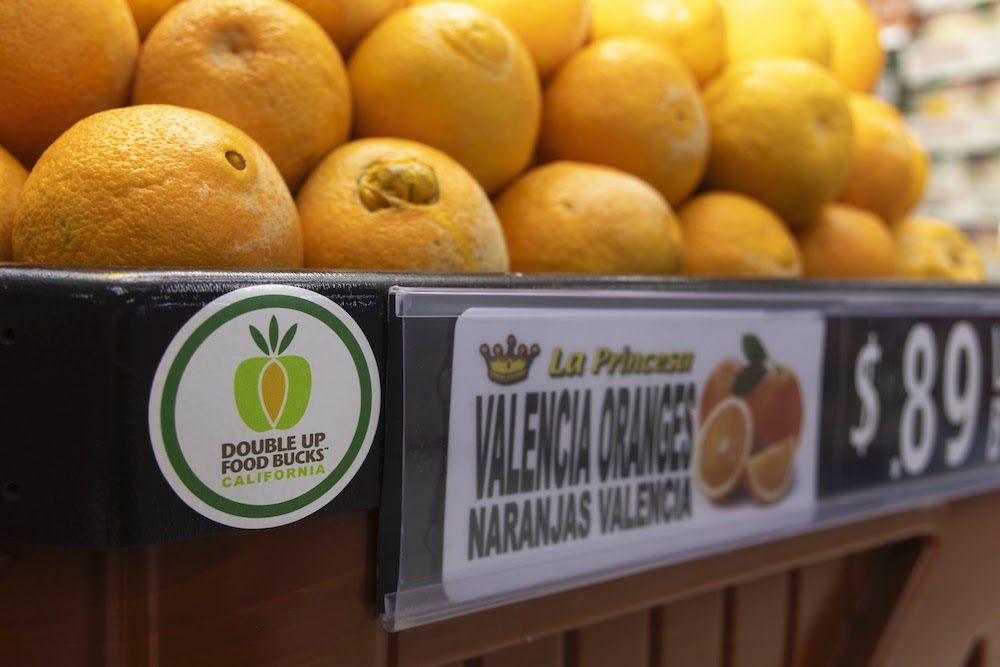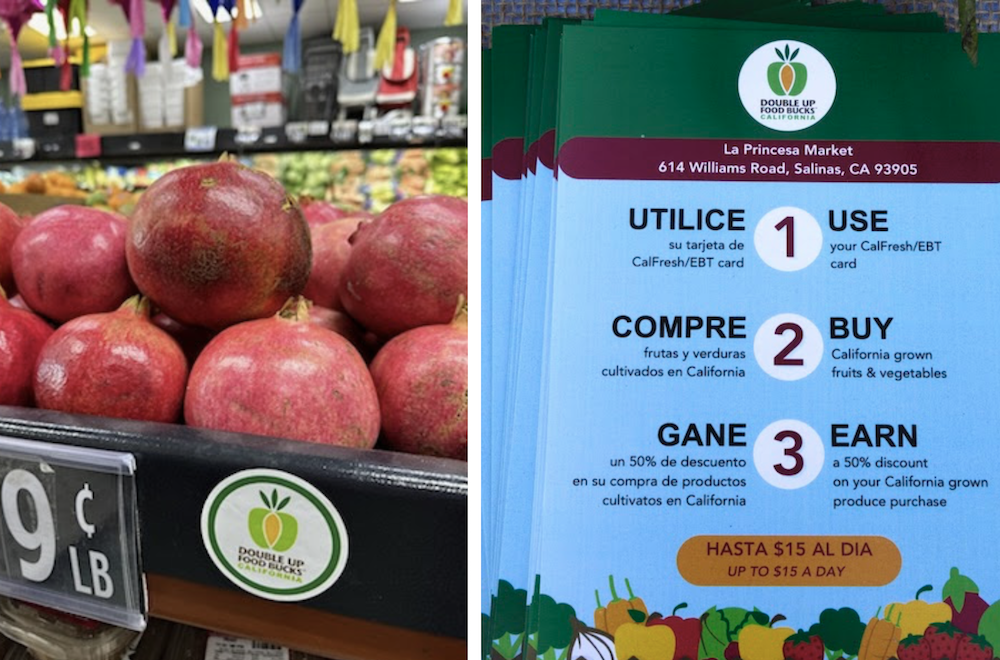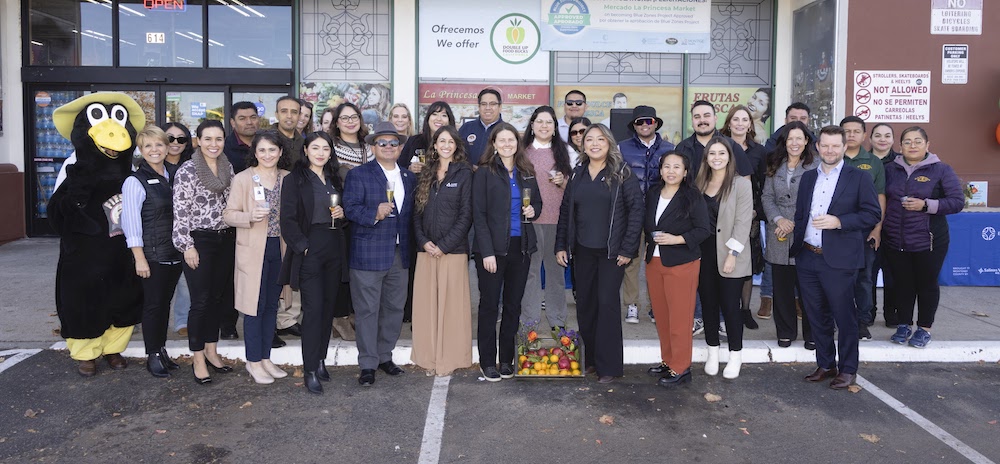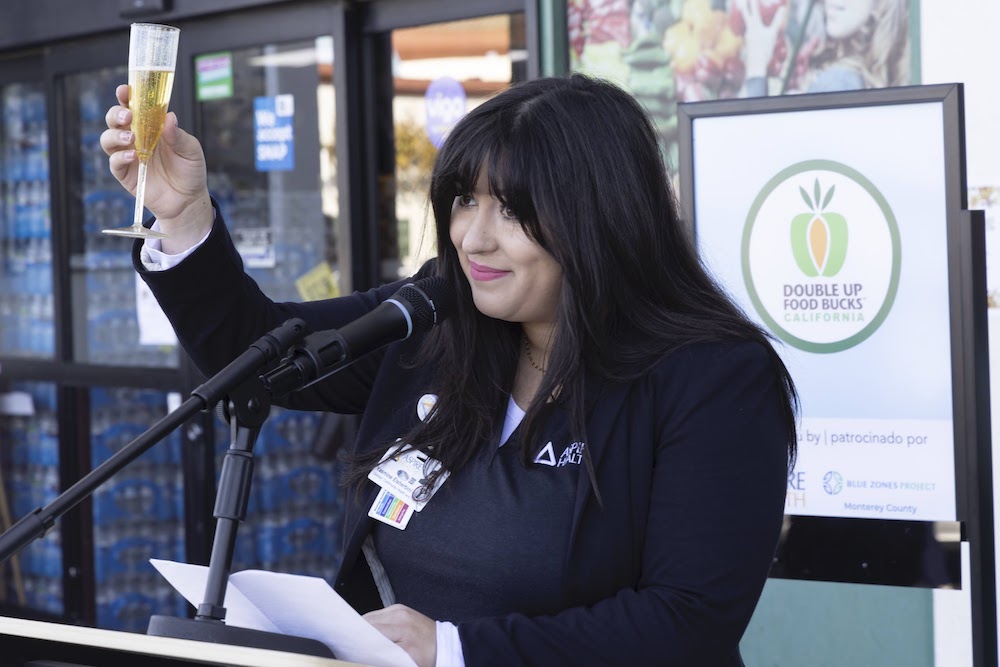
November 26, 2023 – Double the healthy food is good, especially for the area’s most vulnerable.
Triple the healthy outcomes, better yet.
Quadruple…well, let’s not get too carried away just yet.
Double good first: The Double Up Food Bucks program—with its proven ability to connect food-insecure families and individuals to more fresh produce—officially debuted in Monterey County yesterday.
Its first location, family-owned Mercado La Princesa Market on Williams Road in East Salinas, hosted the announcement. (Double Up Princesa launched quietly at the end of October for what was a successful trial run.)
True to its name, it doubles the benefits for those who use it: Low-income families participating in CalFresh (formerly known as food stamps) can swipe their EBT card and get $20 worth of California-sourced fruits and vegetables for $10 (or $10 for $5 or $30 for $15, etc.) in much the same way that the Farmers Market market match system works.
The program meets an ample need in Monterey County, as a 2022 United Way community health needs assessment emphasizes.
Among its findings: 40.8% of county residents were found to be food insecure—two out of five—having, per the study, “run out of food in the past year and/or been worried about running out of food.”

The numbers get worse in South County, Salinas and often dip for women, younger residents, lower-income residents, communities of color and LGBTQ+ against the average.
But as fundamentally helpful as that support has proven to be in California counties and other states where it already exists, Double Up is designed to impact more than at-risk eaters.
That was a point worth underlining from Double Up’s coming out party.
Yasmine Elsherbini, the director of community health and wellness at Aspire Health, noted as much from the podium.
“The Double Up Program is a triple win for our community,” she said. “It makes healthy food more affordable for low-income families and individuals, it supports economic development through independently owned grocery stores and it increases demand for California-grown produce.”
Add in the benefits for taxpayers who fund the health system—plant-forward diets, after all, help prevent expensive chronic diseases like diabetes and obesity—and it’s a quadruple victory. (For more on how preventive investment saves big, check out Edible’s food-as-medicine deep dive, “Doctor’s Orders: Produce prescriptions are preventing disease and saving local lives.”)
The community assessment found the only thing more distressing than lack of access to healthy food was access to health care services. While it’s not a solution to the latter, the former doesn’t hurt.
Aspire Health, a nonprofit healthcare provider created by Montage and Salinas Valley Health to address care and coverage for Monterey County, is one of the partners on the local launch of Double Up.
Another partner: Blue Zones Project (BZP), whose restaurant, workplace and policy efforts push “to make the healthy choice the easy choice.”
BZP Food Policy lead Genevieve LeBlanc drafted the grant request to California Department of Food & Agriculture’s Nutrition Incentive Program in spring 2022 (with Aspire as the nonprofit partner and recipient of monies).
But she has been meeting with La Princesa leadership for four years. (Full disclosure: I sit with Elsherbini and LeBlanc on Monterey County Food System Coalition, whose goals include increasing access to healthy food for food-insecure people and expanded procurement of locally sourced food.)

Those meetings involve designing elements like high-visibility end caps, check-out lanes and healthy food labels so heart-healthy options have a fighting chance against Big Candy.
“Companies invest millions [to spark] impulse purchasing,” she says. “La Princesa’s checkout lane is bananas instead of chocolate bars.”
LeBlanc elaborated on the Blue Zones approach and how La Princesa reflects it when it was her turn to take the mic. (Like most presenters, she communicated every bullet point in fluent English and Spanish.)
“It’s really easy to tell someone, ‘Eat more veggies, you’ll be healthier,” LeBlanc said. “It’s really another thing to make it affordable and [create] more access to healthy produce.”
Later she added, “The fact that the program is available and those with food insecurity have more purchasing power for healthy food is what’s making me the happiest right now. There’s a limit to putting all the responsibility on individuals.”
Jackie Chon, longtime La Princesa general manager, collaborated with Blue Zones on making changes to aisles and exits, and then on installing the register systems to receive EBT cards and process discounts quickly and easily.
“I love this idea that we are able to help the California growers, and are helping the community,” she says. “Prices are high and community members are struggling, especially seniors and those with kids. For people with EBT it’s extra help.”
Similar programs are already in place across the country. A Bay Area-based public policy nonprofit called SPUR (San Francisco Bay Area Planning and Urban Research Association) helps support similar programs regionally, and advised LeBlanc and Aspire on how to set up everything from how to dial in marketing outreach to reprogramming the register.
Eli Zigas, SPUR’s food and agriculture policy director, can point to hard evidence nutrition discount programs help people buy more produce, improve their nutrition and stretch their budgets.
He can also sum up what they positively impact in three words: “Hunger, health, ag.”

Back in front of La Princesa on Williams, a couple of political leaders weighed in.
That included Monterey County Supervisor Luis Alejo (“Success means thousands of local families can benefit from eating more locally grown produce”) and Dominic Dursa, district rep for speaker of the California State Assembly Robert Rivas (“What today means: We heard the challenges, [namely] the need for more nutritious food”).
For advocates like LeBlanc and Zigas, political momentum bodes well for nutrition infrastructure that’s policy-driven, not grant-based.
“We have a vision—and coalition of people at state level—focused on seeing programs like Double Up become a permanent supplement to CalFresh,” Zigas says.
One such program—through a different state safety net, the California Department of Social Services—is thriving at eight Bay Area grocery stores and being piloted at Santa Fe Mercado on North Main in Salinas. The California Fruit & Vegetable EBT Pilot Project furnishes CalFresh participants with an instant rebate at the register that covers up to $60/month.
In other words, the proof is clear, and the tools are out there.
“These programs work,” he says. “If we want to have a larger impact on hunger and health and California farmers, we should meet the need to make these programs much much bigger.”

There’s more potential progress where that came from, from La Princesa’s own immediate vicinity: LeBlanc specifically hopes Double Up inspires places like La Princesa to turn toward California organic.
Princesa doesn’t currently stock it because of price points. But if Cali product is half price compared to conventional produce grown in Yuma, Arizona—where many Salinas growers focus in the off-season—that changes the math.
La Princesa produce manager Braulio Juarez and GM Chon even joined a recent tour of ALBA’s organic growers.
“How great would it be to have a section From Local Growers at ALBA?’” LeBlanc says. “It’s 10 miles from here! A lot of farmers live in the neighborhood!”
One takeaway there: While some benefits of nutrition programs like Double Up are clear, even self-evident, empowering food access can lead to plenty that are less obvious.
Elsherbini closed the press conference by proposing a toast with Watsonville-grown and –pressed Martinelli’s apple cider.
“Cheers to improving the health of the community,” she said, “and a vibrant future.”
The symmetry of her statement made sense. The progress is real. But it’s only a start.
About the author
Mark C. Anderson, Edible Monterey Bay's managing editor, appears on "Friday Found Treasures" via KRML 94.7 every week, a little after 12pm noon. Reach him via mark@ediblemontereybay.com.
- Mark C. Andersonhttps://www.ediblemontereybay.com/author/markcanderson/
- Mark C. Andersonhttps://www.ediblemontereybay.com/author/markcanderson/
- Mark C. Andersonhttps://www.ediblemontereybay.com/author/markcanderson/
- Mark C. Andersonhttps://www.ediblemontereybay.com/author/markcanderson/



